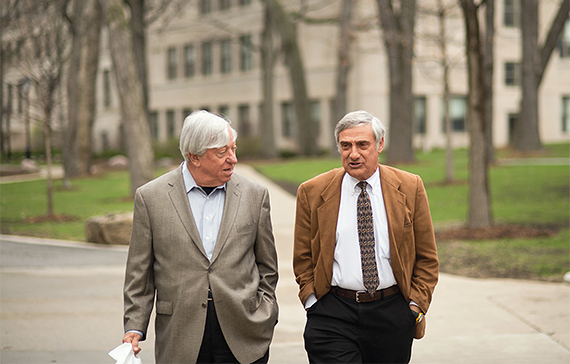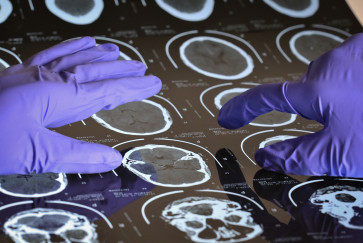Northwestern University’s Center for Economic History in the Judd A. and Marjorie Weinberg College of Arts and Sciences has received a $2.5 million grant from the Menard family.
The grant will fund a faculty position for an economic historian, who will serve as associate director of the center. The grant also will fund two postdoctoral fellowships, faculty and student research, and administrative support.
“The Menard grant will solidify Northwestern University’s position as the premier center for economic history worldwide,” said Joel Mokyr, co-director of the center, the Robert H. Strotz Professor of Arts and Sciences, and professor of economics and history at Northwestern.
Situated within the department of economics at Northwestern, the center now has a teaching staff of 21, including six full-time faculty members in economics and 15 postdoctoral students, adjunct instructors and faculty affiliates in other departments including the Kellogg School of Management at Northwestern.
A traditional strength of Northwestern, economic history has produced three presidents of the economic history associations and has trained top scholars in the field, currently teaching at top research universities. The Menard family grant will strengthen the center’s position, making it possible to invite visiting scholars, host conferences and fund graduate student research in economics, history and the Kellogg School of Management.
“Economic history by its very nature is an interdisciplinary area, straddling not just history and economics, but also politics, engineering and even medicine,” Mokyr said. “It is above all social science at its very best, combining historical understanding, formal quantitative methods, the burgeoning use of Big Data and cutting-edge methods of collecting and analyzing data, including machine learning and optical character recognition. Thanks to the Menard family’s generosity, the center will be able to fund ambitious and innovative projects that shed light on many tantalizing and unresolved questions in economic history that, until now, were not exposed to rigorous and data-intensive analysis.”
This is the first grant the Menard family, who previously funded programs at other universities in the Midwest, has awarded to Northwestern.
“To stay relevant, all of us need to embrace learning and new ideas so that we can create an America where nobody gets left behind,” the Menard family said. “We hope our support of Northwestern will enhance the educational experiences of students, preparing them for future success and inspiring generational prosperity throughout communities across the Midwest to lead the way.”
Read the Menard family’s open letter here.
“I deeply appreciate this investment of the Menard family in the research and teaching of economic history at Northwestern,” said Adrian Randolph, dean of the Weinberg College. “This support honors the extraordinary scholarship and leadership of Professor Mokyr and permits us to continue building one of the strongest programs in economic history in the world.”
Under the direction of Mokyr and Joseph Ferrie, professor of economics and department chair, the Center for Economic History at Northwestern is committed to encouraging and supporting rigorous academic research and fostering the continuous interaction of students, postdoctoral fellows and faculty on any topic of historical interest to economists and other social scientists.
The department of economics at Northwestern, ranked #7 by U.S. News and World Report, boasts a renowned Ph.D. program and offers one of the most in-demand undergraduate majors at Northwestern. The department is home to a Nobel Prize, awarded in 2010 to longtime faculty member Dale Mortensen (1939 – 2014). Current faculty are widely published in leading academic journals, have been elected as fellows of prestigious professional organizations and have won awards for the quality of their teaching.
The grant counts toward We Will. The Campaign for Northwestern. The funds raised through the “We Will” Campaign are helping realize the transformational vision set forth in Northwestern’s strategic plan and solidifying the University’s position among the world’s leading research universities. More information on the “We Will” Campaign is available at wewill.northwestern.edu.


